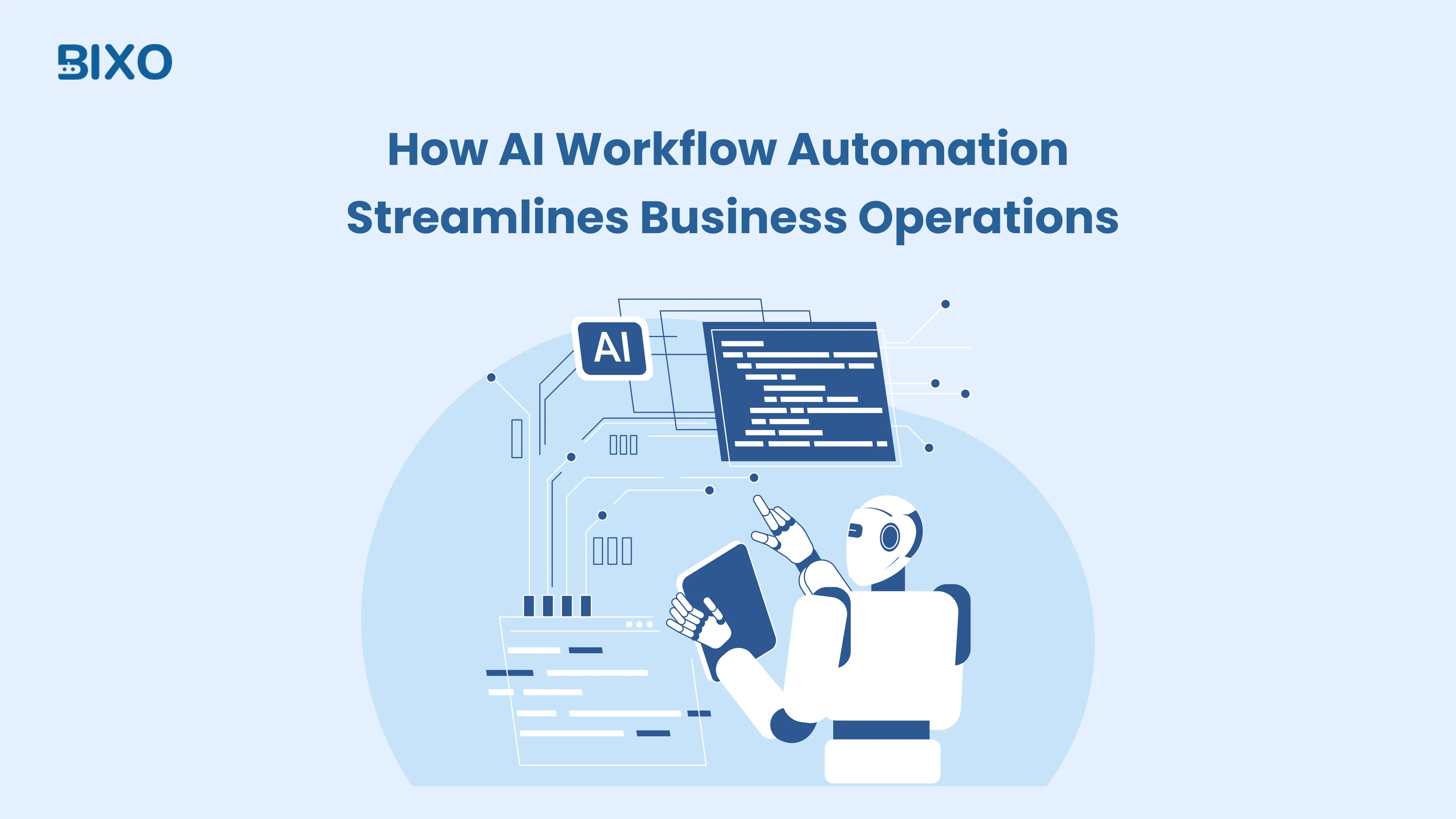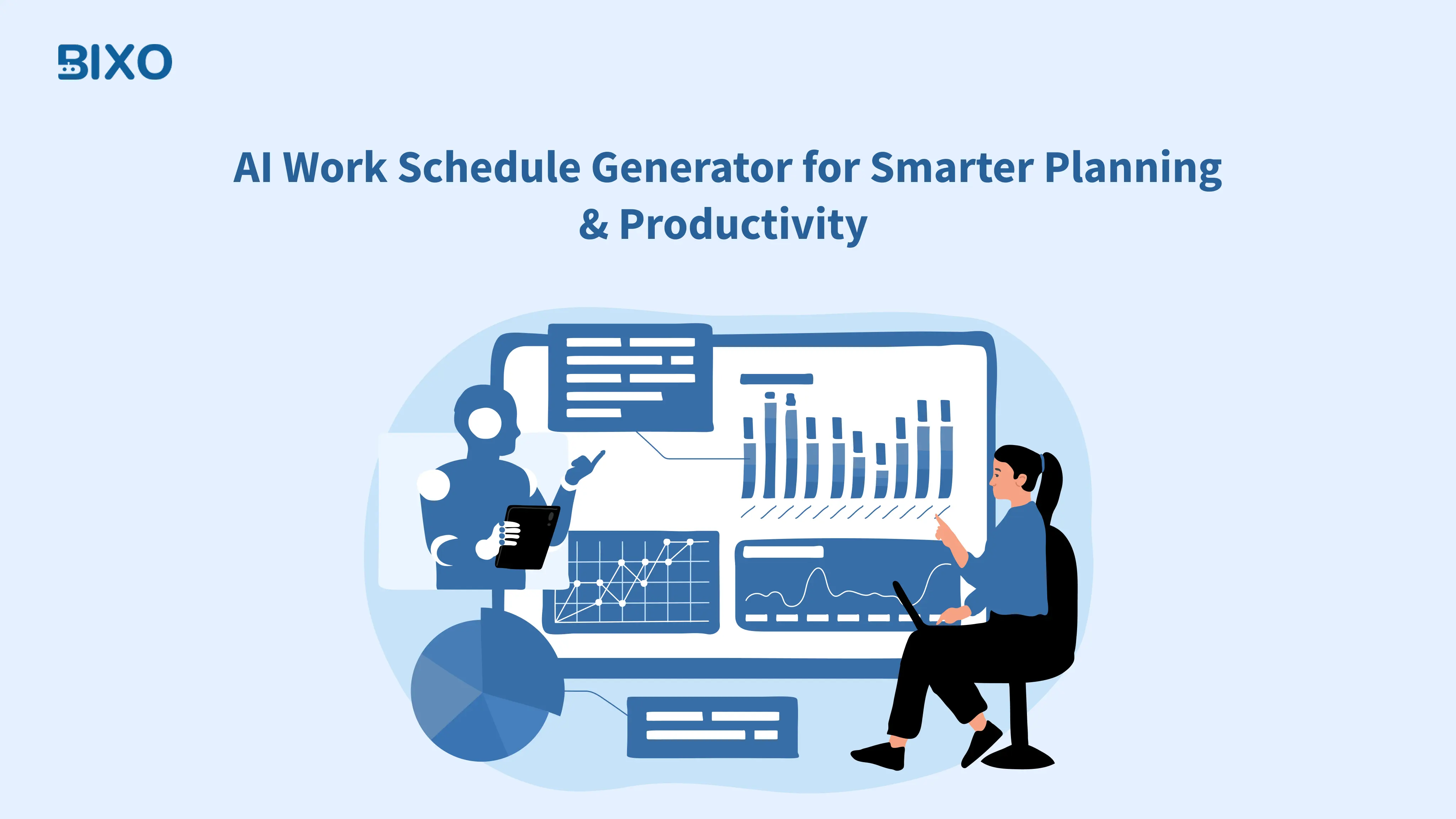
Table of Content
Focus on what matters. BIXO handles the rest!

Running a business often means handling countless tasks, approvals, and updates that take up valuable time. AI workflow automation changes that by streamlining repetitive processes and helping your team focus on what truly matters. It brings speed, accuracy, and consistency to your daily operations while reducing human error and delays.
In this blog, you’ll learn how AI workflow automation can simplify your business processes, improve productivity, and create a smoother, more efficient way of working.
What is AI Workflow Automation?
AI workflow automation is the use of artificial intelligence to streamline and manage everyday business processes. It automates repetitive tasks such as approvals, notifications, and data handling, ensuring that work flows smoothly across teams.
Technologies in AI Workflow
AI workflow uses smart technologies like chatbots and data tools to handle tasks for you, speed things up, and make your work life easier. Below are some of the main technologies used.

Machine Learning & Predictive Analytics
AI work assistant automation systems gain knowledge from past data, including patterns to predict delays and identify outliers. This way, workflows help teams to stay ahead and fix issues, preventing problems before they occur.
Natural Language Processing (NLP)
Through NLP, systems can understand and process text from emails, documents, or messages. It extracts important information, organises content, and triggers workflows automatically without any manual effort. This makes AI workflow automation faster and more efficient.
Robotic Process Automation (RPA)
Robotic Process Automation (RPA) uses intelligent bots to perform day-to-day tasks like filling forms, entering data or sending routine emails, etc. It not only saves time but also reduces errors by tracking deadlines , removes repetitive tasks, and ensures you don’t have to repeat the same work again, which plays an important role in workflow automation AI.
AI Workflow Use Cases
AI workflow automation technology is being implemented in various domains like, customer service, HR managers, IT managers, and finance managers, and can help organisations do tasks faster, with fewer mistakes, and less manual effort. Here are some actual ways AI is helping modern organisations automate day-to-day work.

Customer Service & Support
AI workflow automation helps with the customer journey from the first interaction to solving issues. It can answer common questions and send complex problems to the right team. One company can cut customer wait times by 40% with the use of AI.
Recruiting & HR
Workflow automation tools have the ability to read resumes, schedule interviews, and onboard new hires. They also pull important information from documents, saving time and reducing mistakes in hiring and HR tasks.
Reduces Delays and Avoids Missed Deadlines
If a single task gets delayed, it can slow down the whole project. AI task automation helps avoid this by watching how tasks are progressing and sending reminders when something might be falling behind.
It also alerts team members when deadlines are coming up soon. This way, you can fix issues before they become big problems. It helps your projects stay on schedule and keeps your clients happy.
Invoice Management
AI with RPA can handle tasks like checking vendor details, comparing prices, tracking orders, and checking invoices. This makes the whole process faster, smoother, and reduces work stressin AI workflow automation.
Common Challenges in AI Workflow Automation
AI workflow automation can simplify and speed up your work, but it’s not always easy to set up. There are often some challenges in teams you should know.

Poor Data Quality
For AI to work for you, it must have clean and accurate data. If your data is incomplete, old, or inconsistent, then chances are that when the data is analysed, the AI will make poor decisions or miss critical chain elements of the situation.
Blending AI with Existing Tools
It can be challenging to connect AI workflow automation solutions with old software or systems. Workflows can fail without proper connections and integration, where events are triggered.
Lack of Skilled Talent
To create and maintain everything around AI for workflow automation, you have to understand AI, automation, and data. Many organisations have a hard time finding the right people with good skills to implement and maintain these systems.
High Initial Costs
Workflow automation tools can cost a lot at first. You may need to pay for tools, setup, and experts, which can be hard for small teams or businesses. This can be challenging for small teams or small-budget businesses.
Resistance to Change
People might not feel comfortable using workflow automation AI if they're used to previous ways of working. To make it work, businesses need to establish trust, give proper training, and explain how AI will support and not replace their work.
Best Practices to Implement AI workflow
Implementing AI workflow automation can be smooth and effective with the right approach. By following some best practices, you can avoid mistakes and get better results. Here are some of the best ways to get it right:

Start Small and Grow
Simply start with a task that is easy to automate and shows results quickly. As you become confident in what is working, you can start to increase automation slowly. This approach gradually leads to what’s known as “process growth” in AI for workflow automation.
Focus on Real Needs
Choose tasks where AI workflow automation can make a real difference, like time management tools, avoiding mistakes or making things a better experience for customers.
Keep Your Data Clean
Make sure your information is up-to-date and well-organised. Clean data helps AI to make smarter decisions and avoid mistakes that come from poor-quality inputs.
Use Tools That Work Together
Pick AI workflow automation tools that connect easily with your current systems, like CRM or finance apps. This ensures smooth operations and fewer technical headaches.
Teach Your Team
Educate your staff on how AI workflow automation works, its advantages, and how to engage with it. It builds trust, lowers resistance to change, and empowers your team to use AI tools with confidence and efficiency.
Popular Tools for AI Workflow Automation

In this modern era, there are many powerful AI workflow automation tools that make your life simpler than ever. Whether you are a small team or a large company, these systems will help you work faster and become more productive, saving your time.
BIXO
BIXO is an AI-manager assistant designed to simplify task and project management through smart workflow automation. It monitors team activities, prioritises tasks, and ensures work stays on schedule without constant manual follow-ups.
Using intelligent alerts and predictive insights, BIXO identifies potential delays, helps teams stay aligned, and reduces unnecessary meetings. It automates updates and progress tracking, allowing managers to focus on strategy planning while keeping projects running efficiently.
IBM
A no-code platform that combines intelligent agents with over 80 enterprise apps. Workflow automation AI makes it perfect for automating complex, multi-step workflows that involve multiple teams or departments.
Appian AI
With the Appian low-code platform, AI agents, RPA, and analytics are built in AI for workflow automation to automate activities such as processing content and approvals to reduce workflow time by up to 83%.
Moveworks
An Artificial Intelligence-driven chatbot that provides IT and HR support, easily integrates with systems such as Slack, Teams, and ServiceNow to improve your support time and the overall experience through intelligent workflow automation.
Conclusion
AI workflow automation is transforming the way businesses operate by removing repetitive tasks, improving accuracy, and saving valuable time. It allows teams to focus on innovation and decision-making instead of routine work. From managing approvals to tracking progress, automation ensures every process runs smoothly and efficiently.
Tools like BIXO make this transformation even easier by bringing intelligent scheduling, smart alerts, and real-time insights into one platform. By adopting AI workflow automation, you can create a more productive, organised, and future-ready workplace that runs effortlessly.
Now is the time to embrace AI workflow automation and see how it can simplify your operations while driving consistent growth.
FAQs
AI saves time by automating manual tasks, improving accuracy with data-driven insights, and ensuring smoother coordination between teams and departments.
Yes, AI Workflow Automation is useful for businesses of all sizes. It reduces workload, improves task visibility, and helps small teams achieve more with fewer resources.
Yes, most AI workflow automation tools follow strict security protocols to protect your data. They use encryption, access controls, and compliance standards like SOC 2 or GDPR to ensure your business information remains safe.
BIXO not only automates workflows but also tracks team progress, predicts delays, and sends real-time alerts. It ensures every task stays on schedule and every team member remains aligned.
You can automate tasks like approvals, notifications, reporting, data entry, scheduling, and follow-ups, allowing teams to focus on strategic work instead of routine processes.
Get a demo of BIXO
Recommended Blogs

Top AI Work Assistants to Boost Productivity
Boost your productivity with the best AI work assistant tools. Discover top picks for automating tasks, staying organised, and managing work smarter in 2025.
 Tarun Kumar Reddy Atmakuru |
Tarun Kumar Reddy Atmakuru |
 Oct 17, 2025
Oct 17, 2025


